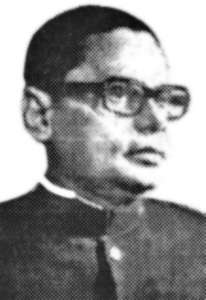Abu Sayeed Chowdhury
| Abu Sayeed Chowdhury | |
|---|---|
| আবু সাঈদ চৌধুরী | |
 | |
| 2nd President of Bangladesh | |
|
In office January 12, 1972 – December 24, 1973 | |
| Prime Minister | Sheikh Mujibur Rahman |
| Preceded by | Sheikh Mujibur Rahman |
| Succeeded by | Mohammad Mohammadullah |
| Personal details | |
| Born |
31 January 1921 Kalihati Upazila, Tangail District, Bengal Presidency, British India (now in Bangladesh) |
| Died |
2 August 1987 (aged 66) London, England, United Kingdom |
| Political party | Awami League |
| Religion | Islam |
Abu Sayeed Chowdhury (January 5, 1921 - August 2, 1987) was a jurist and the second President of Bangladesh who was the first to be sworn into office.[1] Abu Sayeed Chowdhury was born on January 5, 1921 in a Zamindari (Landed) family of Nagbari in Tangail District. His family's old heritage and wealth is widely known.[2] His father Abdul Hamid Chowdhury apart from being a Zamindar become the speaker of the East Pakistan Provincial Assembly later on in his life. Abdul Hamid Chowdhury was given the title "Khan Bahadur" by the British Empire, a title which he later renounced to give his voice to the movement against British atrocities and the British Empire.
Education
Abu Sayeed Chowdhury graduated in 1940 from the Presidency College in Calcutta.He later on obtained his Masters and Law degrees from Calcutta University in 1942 and after the second world war he went to the United Kingdom to do Bar-at-Law in London.[2]
Professional career
Abu Sayeed Chowdhury joined the Calcutta High Court Bar in 1947, and after the partition of India he came over to Dhaka and joined the Dhaka High Court Bar (1948).[2] He was a practising Advocate of Dhaka High Court and was a very renowned lawyer. In 1960, he was appointed as advocate general of East Pakistan.He was elevated to the post of Additional Judge of the Dhaka High Court on July 7, 1961 by the then President of Pakistan Field Marshal Mohammad Ayub Khan and was confirmed as Judge of the Dhaka High Court after two years. He had been a member of the Constitution Commission (1960–61) and chairman of the Bengali Development Board (1963-1968). Justice Chowdhury was appointed as vice-chancellor of Dhaka University in 1969.[2] In 1971, while in Geneva he resigned from his post as vice-chancellor as a protest against the genocide in East Pakistan by the Pakistan army.[1] From Geneva he went to the UK and became the special envoy of the provisional 'Mujibnagar' government. An umbrella organization, 'The Council for the People's Republic of Bangladesh in UK' was formed on April 24, 1971 in Coventry, UK, by the expatriate Bengali's, and a five-member Steering Committee (central committee) of the Council was elected by them. He was the High Commissioner for the People's Republic of Bangladesh, London from August 1, 1971 to January 8, 1972)[3]

President of Bangladesh
After liberation, Justice Chowdhury returned to Dhaka and was elected as President of Bangladesh on January 12, 1972. On April 10, 1973,[2] he was again elected as President of Bangladesh, and in the same year (December) he resigned and become special envoy for external relations with the rank of a minister. On August 8, 1975, he was included in the cabinet of Bangabandhu Sheikh Mujibur Rahman as minister of Ports and Shipping. After Bangabandhu Sheikh Mujib was assassinated he became the minister for Foreign Affairs in the cabinet of President Khondakar Mostaq Ahmad (August 1975), a position which he held till November 7, 1975.[2]
UN Committee
In 1978, Justice Chowdhury was elected a member of the United Nations Sub-committee on Prevention of Discrimination and Protection of Minorities.[2] In 1985, he was elected chairman of the UN Human Rights Commission.[1] He was honoured with the insignia of 'Deshikottam' by Visvabharati University. Calcutta University awarded him the honorary degree of Doctor of Law an event which was attended by the Prime Minister of India, Indira Gandhi. His book Probasey Muktijuddher Dingooli (1990) is a valuable contribution to the understanding of Bangladesh War of Liberation. He died of a heart attack [4] in London on August 2, 1987 and was buried in his village, Nagbari of Tangail.
References
- 1 2 3 "Death anniversary of Abu Sayeed Chowdhury today". The Daily Star.
- 1 2 3 4 5 6 7 "Choudhury, Justice Abu Sayeed". banglapedia.org.
- ↑ "Archived copy". Archived from the original on 2012-07-07. Retrieved 2012-08-03.
- ↑ Ap (August 3, 1987). "Abu Sayeed Chowdhury, 66; Was President of Bangladesh". The New York Times. ISSN 0362-4331. Retrieved 2016-03-21.
External links
- "Justice Abu Sayeed Chowdhury".
- "London 71: The opening of diplomatic offensive".
- "Abu Sayeed's birthday today".
- "The Diaspora engagement in the war".
- "Leaders of Bangladesh".
- "List of Former Ministers/ Advisers".